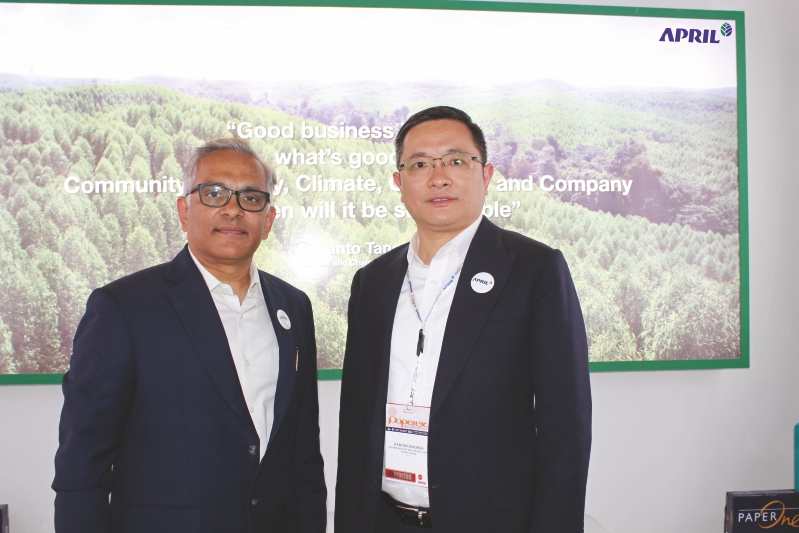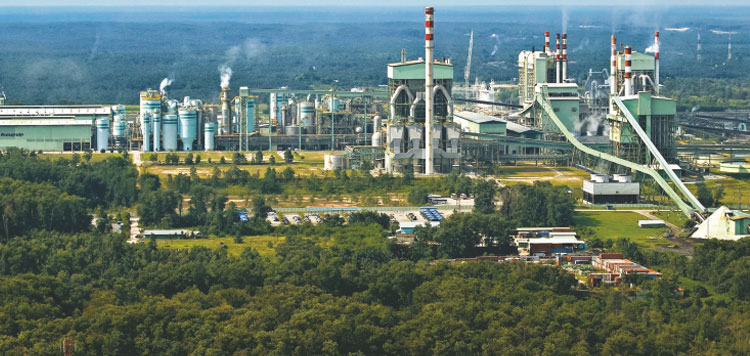Asia Pacific Resources International Holdings Ltd (APRIL), a global name in pulp and paper industry and sustainability, has termed India as an important ‘client’ for the company. This information was shared by Mr. Suneel Kulkarni, Managing Director, Pulp, Paper and Board, India and Subcontinent, APRIL Group and Mr. Wanyan Shaohua, Paper Business Head, Vice President, Commercial, APRIL Group, in a joint interaction with Paper Mart during Paperex 2023.

Paper Mart: Please take us on the business journey of APRIL Group, how it came into being, its growth along the years, entering into the Indian market, and the milestones achieved so far.
Wanyan Shaohua: APRIL is a member of the RGE Group, which was founded by Sukanto Tanoto in 1973. Under his leadership, the RGE Group grew into a global group employing more than 70,000 people, with assets totaling more than USD 35 billion and worldwide sales reach. RGE has different businesses, one of them being common paper and forestry. For the common paper business, RGE has firstly APRIL Group, representing Indonesian assets, second, a company called Asia Symbol in China, which produces pulp, paper, board and tissue in China, and a third company, Bracell, in Brazil producing pulp as one of its main products.
APRIL is one of the largest, most technologically advanced and efficient, integrated common forestry, pulp and paper, and board making companies globally, with headquarters in Singapore. Our main manufacturing facility is in Indonesia, where we have almost 500,000 hectares of fiber plantations and a big industrial complex. We produce around 3 million tonnes of pulp, 1.15 million tonnes of fine paper, and 300,000 tonnes of viscose per annum.
The mill uses world-class engineering to manufacture quality pulp and paper products, which have applications in various segments, such as packaging, printing and writing paper, tissues, shopping bags, food packaging, magazines, and books. We have three pulp lines and three paper machines. We are working on increasing current production capacity, which we call a ‘debottlenecking project’.
Suneel Kulkarni: We have been in India for the past 25 years. I think the last five years and the coming years are going to be very important for us. India has become an important market for us and we cannot ignore it. However, we want to be a complementary player because Indian mills are already there and the ecosystem is quite conducive. We cannot just come over and disturb the market as well as prices.
We are here to fill in the gaps in terms of volume and quality. We take pride in producing good quality paper. There is a demand for quality paper. Customers are ready to wait for three months on the order cycle. There are local mills, which can deliver within one week, two weeks or maybe in three weeks. Unfortunately, we can’t do that. Despite that, people are ready to buy and take the bet of price fluctuation. So this means there is a kind of loyalty for us here.
There is a deficit of pulp in the Indian market. Even though, if you look at the majority of paper mills, there is a very healthy financial situation. Still, they do not get into further investment because of scarcity of raw material. The local production is not meeting the current demands and they have to depend on imported pulp. So, Indonesia becomes from a proximity point of view, an obvious choice. We are selling a substantial amount of pulp here.
Watch: Starkraft to Offer Capacity of 350,000 tons from May 2024
PM: What is your USP and strategy for serving the Indian pulp and paper market?
SK: There is a slight difference in the production of pulp and paper. Pulp is much more commoditized. You can’t do much in case of pulp since it is an input commodity. With regard to paper, you can add a little bit of flavor and come out with different rates and different GSMs. Whether it is pulp or paper, we approach both focused on QPC. This means quality and productivity and, if these two things are good, your cost will be optimized.
We try to understand the users, put ourselves in their shoes, to improve the quality as well as productivity. If these two are addressed, then the cost of their production will obviously go down. The approach is uniform, whether it is pulp, paper, board or tissue. Whatever we want to sell, we take the same QPC approach. So it is a decently supplied market demand supply equilibrium. We need to find our niche at the quality level.
PM: Sustainability is quite important to the APRIL Group. Please tell us about your sustainability policy, and what kind of efforts do you put in to ensure that your operations are sustainable?
WS: Our sustainability story starts from the beginning. Together with our expansion and business growth, sustainability has been there, embodied since the beginning. In the first place, 20 years ago, we ensured that the pulp we sourced did not have any legal issues. Following this, we launched our Sustainable Forest Management Policy, SFMP 1.0, which we upgraded to SFMP 2.0 in 2015. Our policy includes our commitments to manage the forests responsibly, to eliminate deforestation from our supply chain, to protect the forest and peatland landscapes in which we operate and to support best practice forest management in all countries where we source wood fiber.
In 2020, we reached a new stage of sustainability. In the middle of the Covid-19 pandemic, we launched our APRIL 2030 sustainability commitments, which cover four different areas – climate positive, thriving landscapes, inclusive progress and sustainable growth – and 18 targets. We were probably one of the first Asian companies to launch this kind of forward-looking sustainability commitment. Every year, we get KPMG to review our performance against our sustainability commitments and our progress against our APRIL2030 targets.
We are also one of the early adopters of what are called sustainability-linked loans. This is a form of financing which is not only linked to finance factors, but also to sustainability outcomes. Based on our sustainability performance, our interest rates on sustainability-linked loans can change. We were probably one of the first Asian companies to start using this kind of sustainability-linked financing a few years back.
Also Read: Silverton Pulp & Papers: Targeting to Manufacture 1500 TPD by 2025
PM: Throw light on APRIL’s upcoming prestigious project of over a million tonne capacity of packaging board. Which markets will it cater to?
WS: We have developed a sustainable paperboard production facility at our operations in Indonesia. This will have the capacity to produce 1.2 million tonnes of fully recyclable and biodegradable folding boxboard.
Indonesia will be one of the main markets and the nearby South East Asian markets because we are also looking at some potential export activities, in the East, or even Europe or America. We need to develop exports in these markets and this will take time. Customers in these markets are very planned, focused, brand-centric businesses and we need to build trust. We really need to be able to walk the talk.
We are also planning to set up a mechanical pulp-making line to integrate and support the paperboard production line. Our long-term plans also include expanding viscose production.

PM: Give insights on the current paper industry and its future prospects.
WS: Packaging board is a very promising product and sector. There are many positive stories behind it. For example, the replacing of plastic. In many countries, including India, the government has launched different policies to try to reduce the use of plastic. If you don’t use plastic, paperboard is a very natural replacement. Besides, there is a global shortage of recycled paper or waste paper. Most paperboards are made from recycled wood.
Because of the raw material shortage, if you look at the historical data in the last 10 years, the share of recycled waste packaging is reducing. The share of good quality and virgin pulp waste packaging is increasing. There are many good stories and positive elements from the demand perspective for paperboard, including the growth of e-commerce. After the Covid-19 pandemic, the demand for food-related packaging requirements has increased manifold.
PM: We would like to understand more about your forests, the kind of operations you do there. How do you ensure sustainability with regard to managing your forests?
WS: We are pursuing a number of practices. First is our 1-for-1 commitment. For each hectare of plantation where we are operating upon, we are committed to conserving another hectare of forest. Second, we have a huge real ecosystem restoration program called Restorasi Ekosistem Riau, which is an initiative to restore a huge area of degraded forest in Sumatra. We have made a lot of effort to become more efficient in our use of resources in a carbon-sensitive world, which has now become a very important topic. Many of our practices in this area are driven by our sustainability commitments.
You need to involve a lot of technology in forestry operations. You need to select the various species that can work for that particular land and areas, and this involves a lot of science and technology.
PM: Any message which you would like to share with the Indian industry.
SK: There is just one message, which we want to give to the local mills and we think they will agree with us on it. We would like to tell them that we are not here to bring down prices, or disturb the market. We want to operate as a complimentary player in the market here, which is certainly what we believe in.



